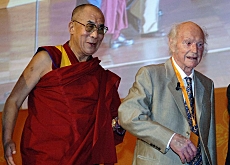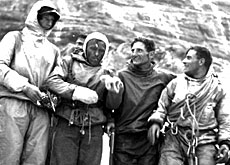Last of the first Eiger conquerors dies

Heinrich Harrer, an Austrian mountaineer and a member of the first team to climb the Eiger North Face in the Swiss Alps in 1938, has died aged 93.
Harrer shot to worldwide fame in 1997 after the film Seven Years in Tibet – based on a memoir he wrote – was released with Brad Pitt in the lead role.
His family in the Austrian province of Carinthia did not mention a cause of death, saying only that he died peacefully in hospital. Harrer will be buried on January 14 in the town of Hüttenberg.
The mountaineer made headlines in 1938 with the first ascent of the Eiger’s North Face in the Bernese Oberland. His achievement earned him fame and a handshake from Hitler.
The fearsome wall above the resort of Grindelwald has one of the most daunting reputations in the climbing world. It is steep, exposed to bad weather, almost always hiding in shadow, and presents alternating patches of rock and ice.
Anyone prepared to climb its 1,800 metres also has to risk being hit by falling rocks.
It remained unconquered until 1938 when a team of four managed to succeed where many had failed – and died – trying.
Harrer and fellow countryman Fritz Kasparek teamed up with Germans Anderl Heckmair and Ludwig Vorg to make the first ascent. Harrer was the last of the four still alive.
Their tale was told in Harrer’s book The White Spider, which is named after an ice field near the summit and is a classic among mountaineering stories.
Dalai Lama
A renowned explorer, Harrer had close links to the Nazi Party, but he was known better for the years he spent with the young Dalai Lama after escaping from British custody in India and trekking to Tibet in 1944.
He was arrested after war broke out in 1939 by the British, who were rounding up Austrian and German nationals.
Nearly two years later he arrived in Lhasa, where he befriended and tutored the Dalai Lama. He taught the Tibetan leader mathematics, English and sports, and became his adviser.
His subsequent book about his experiences before the Chinese takeover in 1951, Seven Years in Tibet, has been translated into 48 languages.
He later explored other remote areas of the globe, wrote about a dozen books and authored some 40 documentary films.
Shortly before the film based on his memoir was released, Harrer’s deepest, darkest secret – his Nazi past – caught up with him.
He joined the Nazi Party when Germany took control of Austria in 1938. The son of a postal worker, the prominent Austrian mountaineer also joined the SS, the party’s police wing associated with atrocities during the Second World War.
But Simon Wiesenthal, the famed Nazi hunter who died last year, said that Harrer was not involved in politics and was innocent of wrongdoing.
Hidden past
Although Harrer was never linked to any Nazi atrocities, many questioned why he took such pains to conceal his Nazi past.
He said in 1997 that he never carried out any activities for the SS and that he had a “clear conscience”.
But he conceded that “from today’s view, the former party and SS membership is an extremely unpleasant thing”.
Harrer said he became a Nazi to further his teaching and mountaineering careers, but did not explain why he had joined their underground SA storm troops in 1933, when the party was still banned in Austria.
swissinfo with agencies
Heinrich Harrer reached the summit of the Eiger via the North Face with three other climbers on July 24, 1938.
Harrer was a member of the Nazi Party and allowed the team’s success to be exploited for propaganda purposes.
The North Face is still considered one of the toughest challenges in climbing.
Harrer was also successful as a ski racer, explorer and geographer.
His book Seven Years in Tibet sold over three million copies before being adapted into a Hollywood film.

In compliance with the JTI standards
More: SWI swissinfo.ch certified by the Journalism Trust Initiative

You can find an overview of ongoing debates with our journalists here. Please join us!
If you want to start a conversation about a topic raised in this article or want to report factual errors, email us at english@swissinfo.ch.